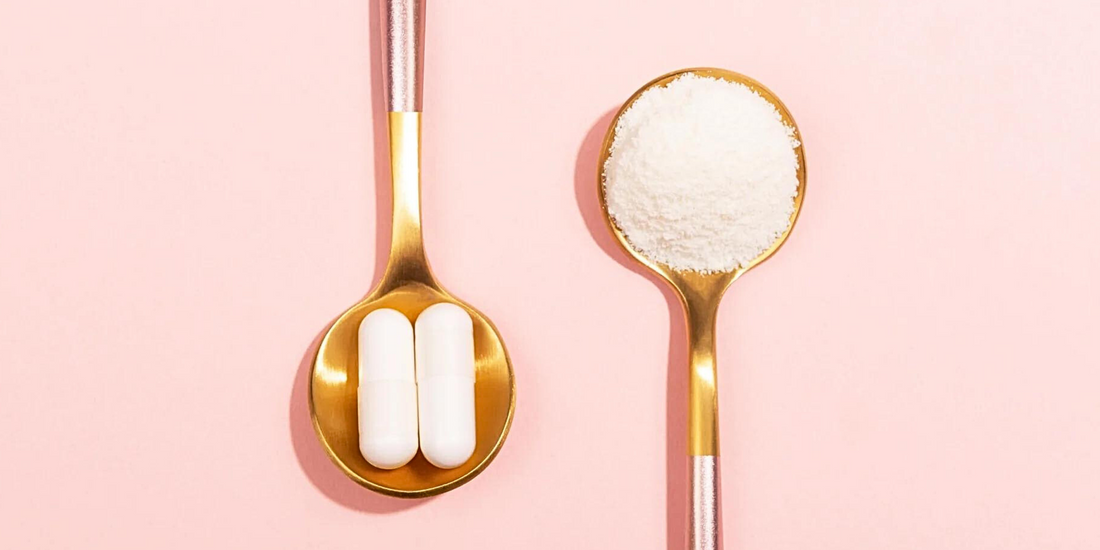Discover the science of youthful skin as we delve into the intricate world of collagen. This powerhouse skin protein constitutes 75% of your skin's dry weight. Learn how to rebuild and restore collagen in your skin giving it natural resilience, strength, and a smooth, youthful appearance.
From essential enzymes to the critical role of Vitamin C, we illuminate the biochemical pathways that stimulate collagen production. Uncover evidence-based strategies to increase collagen levels in your skin, not just through skincare products but also with food and supplements. Don't miss this comprehensive guide for an informed approach to anti-aging skincare that focuses on stimulating collagen production in the skin.
How To Restore Collagen in Skin
The fibroblast skin cells in the dermal layer of your skin make collagen and secrete it into the space between skin cells known as the extracellular matrix (ECM) where it forms a structural scaffolding. The collagen in your skin gives skin strength and thickness. Loss of collagen leads to thin, wrinkled, fragile skin. Methodologies and treatments such as skin care products, supplements, and diet can help increase collagen levels in the skin.
But- guess what- taking collagen powders and supplements is not the best way to increase skin collagen. In fact, these collagen supplements are not very effective.
The best way to rebuild and restore collagen in your skin is to give your skin the building blocks, enzymes, and communication signals it needs to make collagen naturally.
How Skin Makes Collagen
Collagen formation is a fascinating biochemical process that starts within specialized cells known as fibroblasts. Here, collagen begins its life as a precursor molecule called procollagen. The real magic happens when specific amino acids in this procollagen chain undergo transformations, thanks to enzymes. Proline, for instance, is converted into hydroxyproline by the enzyme prolyl hydroxylase. For this transformation to take place, you need some essential players: iron (Fe++), Vitamin C (ascorbic acid), and α-ketoglutarate.
Similarly, lysine residues get an upgrade too; they turn into hydroxylysine under the action of another enzyme named lysyl hydroxylase. And guess what? This reaction also calls for the same trio of vital components—iron, Vitamin C, and α-ketoglutarate. So, understanding these intricate biochemical steps can give you a newfound appreciation for the role of diet and nutrition in maintaining youthful, resilient skin.
The Crucial Role of Vitamin C to Rebuild Collagen
Vitamin C (ascorbic acid) plays an indispensable role in the production of collagen, specifically in the conversion of proline into hydroxyproline. This transformation is facilitated by the enzyme prolyl hydroxylase, which requires Vitamin C to function. Without this vital vitamin, the biochemical pathway stalls, hydroxyproline is not produced, and the synthesis of collagen becomes compromised.
This is why Vitamin C plays such a critical role in skin rejuvenation. If you do not have enough Vitamin C, it does not matter what else you do to rejuvenate your skin- collagen cannot be made without it!
This means that stem cells, growth factors, exosomes, peptides, and other antiaging ingredients are worthless without the presence of Vitamin C in the skin.
Intriguingly, studies have shown that when Vitamin C is added to fibroblast cell cultures, there's a marked increase in collagen production. (3) This underscores not only the essential role Vitamin C plays in collagen synthesis but also its potential effectiveness at boosting collagen production. Therefore, Vitamin C serums, foods high in Vitamin C, and supplements containing sources of Vitamin C or Vitamin C itself are important components of a skin rejuvenation strategy.
Diet, Collagen Powders, and Supplements
Collagen is a protein that's naturally abundant in animal-based products like meat, poultry, and fish. For omnivores, these sources make it relatively straightforward to incorporate collagen into their diet. However, vegetarians and vegans might find it more challenging to obtain this important protein. To navigate this, they can opt for collagen powders and supplements specifically designed to be plant-based. Alternatively, a diet rich in Vitamin C and specific amino acids can provide the necessary building blocks for collagen synthesis. The key amino acids required for collagen production are:
- Glycine - Found in plant-based sources like cauliflower, lentils, kale, soybeans, spinach, and pumpkin seeds.
- Proline - Abundant in asparagus, beans mushrooms, nuts, cabbage, and seeds.
- Hydroxyproline - Less commonly found in plant-based foods, but can be supplemented through plant-based collagen powders.
- Arginine - Available in lentils, pumpkin seeds, soybeans, peanuts, chickpeas, and whole grains.
By ensuring an intake of these amino acids and Vitamin C, vegetarians and vegans can promote their body's ability to produce collagen.
Collagen supplements and powders are not necessary if you have a heathy diet of the above foods or if you eat meat or bone broth. Bone broth is a rich source of collagen in the diet.

